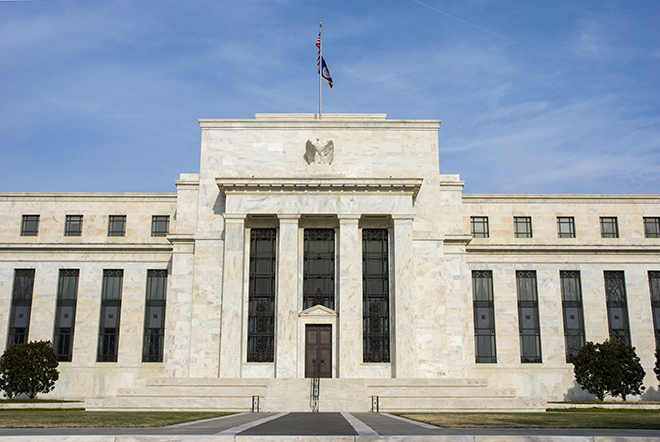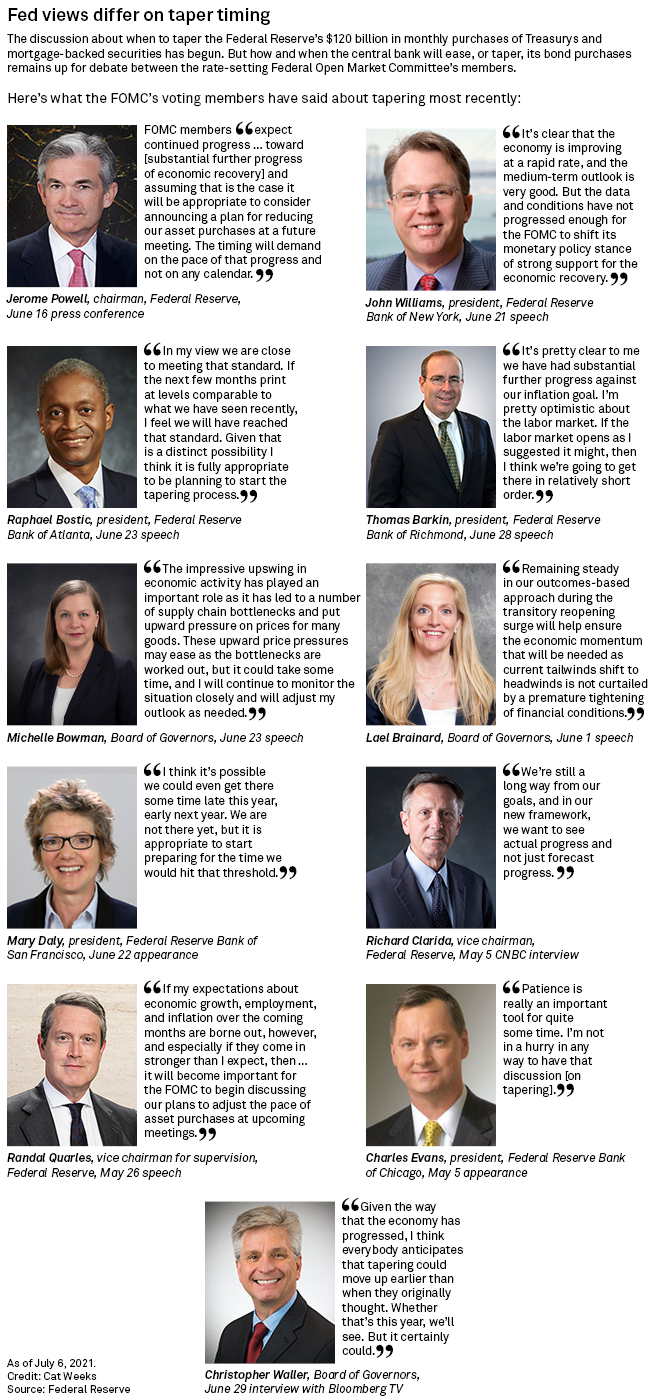S&P Global Offerings
Featured Topics
Featured Products
Events
S&P Global Offerings
Featured Topics
Featured Products
Events
S&P Global Offerings
Featured Topics
Featured Products
Events
Banking & Capital Markets
Economy & Finance
Energy Transition & Sustainability
Technology & Innovation
Podcasts & Newsletters
Banking & Capital Markets
Economy & Finance
Energy Transition & Sustainability
Technology & Innovation
Podcasts & Newsletters
S&P Global Offerings
Featured Topics
Featured Products
Events
7 Jul, 2021

By Brian Scheid

| Fed officials continue to wrestle with when and how to end the central bank's monthly purchases of $120 billion in Treasurys and mortgage-backed securities. Source: uschools/E+ via Getty Images |
Federal Reserve officials believe that the central bank may start tapering its $120 billion in monthly securities purchases sooner than expected, with some pushing for the central bank to stop buying mortgage-backed securities first, according to the minutes of the latest, rate-setting Federal Open Market Committee meeting.
"Various participants mentioned that they expected the conditions for beginning to reduce the pace of asset purchases to be met somewhat earlier than they had anticipated at previous meetings in light of incoming data," according to the minutes of the June 15-16 meeting, which were released July 7.
While the minutes are light on specific dates that Fed officials may be considering, they signal that a growing number of FOMC members believe that jobs and inflation data are approaching the Fed's economic recovery goals.
The U.S. economy added 850,000 jobs in June, its sixth straight month of employment additions, the U.S. Labor Department reported July 2. The core personal consumption expenditure price index, the Fed's preferred measure of inflation that strips food and energy prices from broader inflation measures, hit 3.4% in May, up from 3.1% in April.
On March 23, 2020, in an attempt to ease monetary policy as the coronavirus pandemic took hold of global markets, the Fed announced that it would continue its quantitative easing program indefinitely. The plan included monthly purchases of $80 billion in U.S. Treasury bonds and $40 billion in MBS, which are bonds typically secured by a pool of similar home loans.
Over the past few months, Fed officials have offered mixed views publicly on when the central bank will begin scaling back its monthly purchases.
Both Fed Chairman Jerome Powell and Federal Reserve Bank of New York President John Williams have cautioned that more progress on labor and inflation data was needed before a plan to taper these purchases might take place.
Other members of the rate-setting Federal Open Market Committee have cautioned against shifting policy too quickly, including Lael Brainard, a member of the Fed's Board of Governors, who has warned of "premature tightening" of the Fed's quantitative easing program.
Still, others have indicated that a jump in inflation data and steady growth in the U.S. labor numbers could trigger a taper as soon as late this year. The U.S. economy may be "close" to meeting the Fed's recovery goals, said Federal Reserve Bank of Atlanta President Raphael Bostic on July 23, signaling that an easing of some Fed bond buying may be near.
The minutes from the June meeting show that some FOMC members believe that labor market and inflation data remain somewhat unclear, and some stressed that the committee needs to remain "patient" in both assessing its progress toward recovery goals and announcing tapering plans.
"Participants generally judged that, as a matter of prudent planning, it was important to be well-positioned to reduce the pace of asset purchases, if appropriate, in response to unexpected economic developments, including faster-than-anticipated progress toward the committee's goals or the emergence of risks that could impede the attainment of the committee's goals," the minutes state.
The minutes also noted that "several" FOMC members believe that the Fed should reduce its $40 billion in purchases of mortgage-backed securities earlier than its purchases of Treasurys due to "valuation pressures" in the U.S. housing market.
The Fed's continued MBS purchases have drawn criticism as the housing market has overheated as demand has significantly outpaced supply.
The minutes noted, however, that several committee members see the benefits of continuing to purchase Treasurys and MBS at the same time since they "both provide accommodation through their influence on broader financial conditions."
Matthew Weller, global head of market research at financial services company GAIN Capital, said the minutes show that Fed officials are trying to find a balance as it weighs its ultra-loose policy against the uncertain path of the post-pandemic recovery.
"The central bank is essentially maintaining the high-level view that inflation is transitory, but some FOMC policymakers are starting to question whether the risks of [quantitative easing] and low-interest rates may be starting to outweigh the benefits," Weller said in an email.

